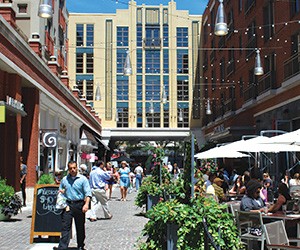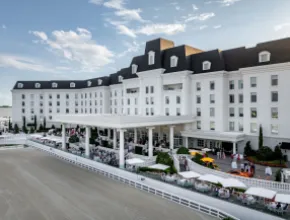Montgomery County is home to some of Washington, D.C.’s first suburbs, the place to which post-World War II federal workers and contractors returned each night to raise their kids and get some sleep.
Today, cities such as Bethesda, Silver Spring and Rockville have gone far beyond bedroom-community status and, especially during D.C.’s post-9/11 boom, have steadily evolved to become destinations in their own right, says Karin Aaron, director of sales at Visit Montgomery CVB.
“For example, what Silver Spring did a few years ago is create an ambience where you can meet, shop and have a lot of experiences while you’re there,” Aaron says. “So you’re not just at a hotel on the side of the road by yourself; they’ve created that environment for you. It’s the same with Rockville and Bethesda. It gives attendees things to do before and after the meeting—take in a show, go to a farmers market or restaurant—for that whole community experience.”
All three cities have invested heavily in creating or diversifying walkable downtown areas that are packed with hotels, restaurants and cultural venues. That said, since business with the federal government is still Montgomery County’s main draw, its major downtowns sit atop transit hubs that combine car, bus and Metro subway service for easy access to the city.
“What makes us attractive is we border D.C., so you can stay outside of Capitol Hill and find availability and affordability as opposed to staying downtown,” Aaron says. “Either you have to be on Capitol Hill or you don’t—and if you don’t, you can find a good place here with us.”
However, plenty of federal agencies have a major presence in the suburbs. For example, the Nuclear Regulatory Commission is headquartered in Rockville, while Bethesda has a major healthcare focus thanks to the sprawling National Institutes of Health campus and the Walter Reed National Military Medical Center (part of which is better known as Bethesda Naval Hospital). The proximity of so much healthcare brainpower has led to dozens of related companies springing up in what has, almost inevitably, been dubbed a BioTech Corridor along I-270.
While 30 years ago this region’s cuisine didn’t venture much beyond French Continental or seafood from nearby Chesapeake Bay, today’s Montgomery County restaurants are much more diverse both ethnically and stylistically. Bethesda’s adjacent Woodmont Triangle and Bethesda Row areas are the town’s perpetual restaurant hotbed, and visitors are encouraged to try Afghan food at Faryab; upscale wood-fired pizzas at Maria’s; or mussels, cooked Belgian-style (and every other style) at perpetually busy Mussel Bar & Grille. (Of course, up-to-date French—with a touch of Danish—still thrives around the corner at Vieux Logis.) Black Market Bistro pleases crowds with its American comfort food and charming, woodsy setting in tiny Garrett Park, located just north of Bethesda.
Ethiopian restaurants such as Bete and Addis Ababa ring the core of Silver Spring, while those looking for a good steak in high style can visit Ray’s The Classics, located just across the street from the American Film Institute’s Silver Theatre.
Aside from restaurant venues, AFI Silver is an excellent place to take in both first-rate and repertory movies or host any function that would benefit from theater seating and absolutely first-rate sound and projection capabilities. Planners needing a larger venue should note that the nearby 2,000-seat Fillmore is available for larger gatherings or outings to see a nearly constant stream of music acts.
Back in Bethesda, the Strathmore Music Center provides a major music venue that attracts fine arts performers such as the National Philharmonic and the Baltimore Symphony Orchestra, while the Mansion at Strathmore hosts more intimate arts gatherings as well as old-school formal tea on Tuesdays and Wednesdays.
For a more outdoorsy adventure, visitors can take a 20-minute drive to the Adventure Park at Sandy Spring, North America’s largest aerial forest adventure park, then zipline and tree-climb day or night. Wood, cable, rope or zipline “trails” between trees are color-coded by difficulty, making it easy to tailor the experience for groups with different skill levels.
Montgomery County has about 50 hotels with almost 10,000 sleeping rooms and over 400,000 square feet of meeting space at varying price points. And in a region long accustomed to diplomatic motorcades as well as public appearances by the president, members of Congress, Supreme Court justices, and generals and admirals, these hotels are always prepared to deal with VIPs and planners’ specialized meeting requirements.
Consider also that Marriott Corporation—with $13 billion in revenue in 2013 and 3,900 properties worldwide—is headquartered in Bethesda, and the area is brimming with hotels trying to attract meetings business, as properties by Choice Hotels (headquartered in Rockville), Hilton (based just across the Potomac River in McLean, Virginia), Hyatt, IHG, Wyndham and other heavyweights compete with the biggest hometown hero.
Air access to Montgomery County is straightforward via an easy drive from any of three area airports—Baltimore-Washington International, Dulles International, and Washington National—with direct Metro rail access to Washington National. Rail access will become even easier once Metro opens its commuter-rail extension to Dulles International in 2018, enabling arriving domestic and international visitors to ride directly from Dulles to Metro stations in Bethesda, Rockville and Silver Spring.






